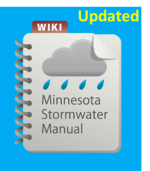
Community Assistance Package Revision as of 14:10, 7 October 2014 by Agelbmann (talk | contribs) (→Other Ways the MIDS Performance Goals are being utilized)
A Federal 319 grant was awarded to the Washington Conservation District to develop and pilot a Community Assistance Package (CAP) and provide a real testing ground for the application of the new MIDS performance goals, credits and calculators. The pilot community project involves regional and focused community assistance in the form of education, training, review and consultation services, and tools and resources such as ordinance goals. Education and training includes NEMO-Nonpoint source Education for Municipal Officials and Stormwater U-technical training for staff and consultants.
Four pilot communities were selected in the St. Croix Basin-Centre City, Chisago, Lindstrom and East Bethel. These communities received free education, training and consulting services to update plans, ordinances and codes to protect their local water resources and ultimately the St. Croix River.
A Community Assistance Package (CAP) was submitted to the MPCA and the MPCA has completed it's review. The package includes performance goals, a calculator for determining stormwater credits for best management practices and ordinance guidance for communities. Use of the MIDS CAP can help a community measure progress toward water and natural resource protection and restoration goals.
File:Community assistance package.pdf
Contents
Communities That Adopted MIDS
Valley Branch Watershed District: In December, 2013, Valley Branch Watershed District amended their stormwater rules to include the MIDS performance goals and Design Sequence Flow Chart. Cities affected by this rule include: White Bear Lake, Maplewood, North St. Paul, Mahtomedi, Pine Springs, Grant, Oakdale, Lake Elmo, Oak Park Heights, Baytown Township, West Lake Township, Woodbury, Afton and St. Mary's Point. For more information, contact John Hanson, Valley Branch District Administrator at 952-832-2622 or jhanson@barr.com. The revised rules can be found on the Valley Branch Watershed District's web site
Communities that are planning to adopt MIDS
The Middle St. Croix Watershed Management Organization was awarded a Clean Water grant in 2014 to implement the MIDS Community Assistance Package. The watershed management organization will work with up to 13 communities in the St. Croix Basin to adopt ordinance and code revisions to incorporate MIDS stormwater quality and volume standards for new development and redevelopment. Contact Mikael Isensee, Administrator of the Middle St. Croix at 651-330-8220 extension 22 or misensee@mnwcd.org.
Ramsey Washington Metro Watershed District is planning to change their current performance goal to the MIDS performance goal in the fall of 2014. Contact Tina Carstens at 651-792-7950 or tina.carstens@rwmwd.org.
Capitol Region Watershed District is planning to change their current performance goal to the MIDS performance goal in the fall of 2014. Contact Forrest Kelley at 651-644-8888 or forrest@capitolregionwd.org.
Riley Purgatory Watershed District expects to adopt the MIDS community assistance package into their rules in the fall of 2014. Contact Claire Bleser at 952-294-5976 or cbleser@rpbcwd.org.
Chisago Lakes Improvement District plans to adopt the MIDS community assistance package in the fall/winter of 2014. Cities include Chisago City, Centre City and Lindstrom. Contact Jerry Spetzman at 651-213-8383 or jpspetz@co.chisago.mn.us.
Other Ways the MIDS Performance Goals are being adopted
The Minnesota Department of Natural Resources has incorporated the MIDS performance goals into their Stormwater and Shoreline Best Management Practices for Public Water Accesses
